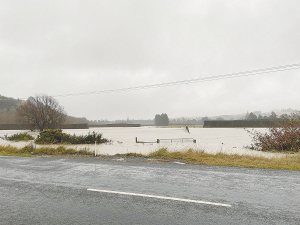120 years through thick and thin
2025 marks 120 years of FMG Advice and Insurance in New Zealand's rural communities.
 Canterbury farmers impacted by the recent flood are being urged to check their insurance cover. Photo: ECan Media Team.
Canterbury farmers impacted by the recent flood are being urged to check their insurance cover. Photo: ECan Media Team.
Farmers affected by Canterbury flooding are being urged to check what business interruption (BI) cover what they have in place.
The suggestion comes from the Insurance & Financial Services Ombudsman (IFSO), Karen Stevens.
"In stressful times such as this, we can immediately see what's obvious - loss and damage to property and land," says Steven.
"But the other costs that lie behind what we physically see can be huge. Other than damage to property, farmers should check the actual loss to the running of their business, as well as running and extra costs to keep property, including stock, safe and well fed."
Stevens recommends checking business interruption policies to see what cover there is, and when it comes into play. "For example - there almost always needs to be physical damage to a farm building before the BI cover will kick in. Is there a stand-down period before you can claim? Is there BI cover if you can't get to the milking shed? What happens if the milk company cannot collect my milk, or I can't get stock to the processing plant? What happens if I have to dump milk?"
Sometimes there is extra cover with farm buildings or contents policies for extra costs incurred - such as bringing in feed, hiring a generator, transporting stock to another farm, or taking them elsewhere for milking.
As well as contacting the insurance company, Stevens says farmers can check their contract with the milk company - or even call them to check expectations. Regional Councils can also be an essential information source.
"Floods can impact the ability to manage environmental risk, so check the relevant Regional Council website for any announcements regarding their expectations, and also call them with any concerns about spills, waste and dumping of milk."
Claims for Resource Management Act (RMA) breaches are not an easy fix. There are other aspects to an ongoing business that can cause interruption.
"Aside from the damage to buildings, check there is cover for fencing, bridges and culverts. These items are not always automatically included, as there may be special terms or limits in cover," she says.
Stevens has a last word of advice.
"Essentially, do the homework on the ongoing costs of how your business will be affected. Do it now and you could save time and cost further down the track."
The 5+ A Day Charitable Trust has launched a collection of affordable recipes designed to turn everyday vegetables into seasonal stars.
Jane Mellsopp has been confirmed as the new Government Appointee to the New Zealand Meat Board (NZMB).
To celebrate the tenth anniversary of its annual Good Deeds competition, Rabobank will give away $100,000 to improve rural community hubs, schools, clubrooms, and marae across New Zealand.
Agricultural and veterinary product supplier Shoof International has appointed Michaela Dumper as its new chief executive.
Federated Farmers is celebrating following the Government's announcement that young farmers will be able to use their KiwiSaver funds to buy their first home or farm.
The Meat Industry Association of New Zealand (MIA) today announced that Chief Executive Officer Sirma Karapeeva has resigned from the role.
OPINION: Staying with politics, with less than nine months to go before the general elections, there’s confusion in the Labour…
OPINION: Winston Peters' tirade against the free trade deal stitched with India may not be all political posturing by the…